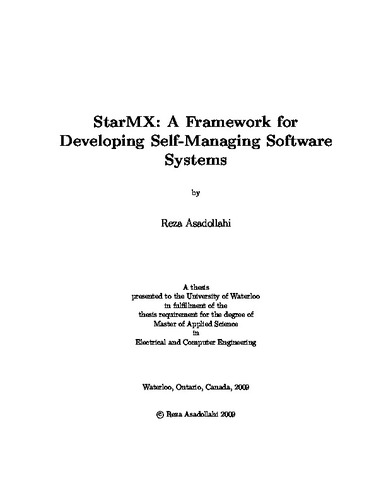| dc.description.abstract | The scale of computing systems has extensively grown over the past few decades in order to satisfy emerging business requirements. As a result of this evolution, the complexity of these systems has increased significantly, which has led to many difficulties in managing and administering them. The solution to this problem is to build systems that are capable of managing themselves, given high-level objectives. This vision is also known as Autonomic Computing.
A self-managing system is governed by a closed control loop, which is responsible for dynamically monitoring the underlying system, analyzing the observed situation, planning the recovering actions, and executing the plan to maintain the system equilibrium. The realization of such systems poses several developmental and operational challenges, including: developing their architecture, constructing the control loop, and creating services that enable dynamic adaptation behavior. Software frameworks are effective in addressing these challenges: they can simplify the development of such systems by reducing design and implementation efforts, and they provide runtime services for supporting self-managing behavior.
This dissertation presents a novel software framework, called StarMX, for developing adaptive and self-managing Java-based systems. It is a generic configurable framework based on standards and well-established principles, and provides the required features and facilities for the development of such systems. It extensively supports Java Management Extensions (JMX) and is capable of integrating with different policy engines. This allows the developer to incorporate and use these techniques in the design of a control loop in a flexible manner. The control loop is created as a chain of entities, called processes, such that each process represents one or more functions of the loop (monitoring, analyzing, planning, and executing). A process is implemented by either a policy language or the Java language. At runtime, the framework invokes the chain of processes in the control loop, providing each one with the required set of objects for monitoring and effecting.
An open source Java-based Voice over IP system, called CC2, is selected as the case study used in a set of experiments that aim to capture a solid understanding of the framework suitability for developing adaptive systems and to improve its feature set. The experiments are also used to evaluate the performance overhead incurred by the framework at runtime. The performance analysis results show the execution time spent in different components, including the framework itself, the policy engine, and the sensors/effectors. The results also reveal that the time spent in the framework is negligible, and it has no considerable impact on the system's overall performance. | en |

